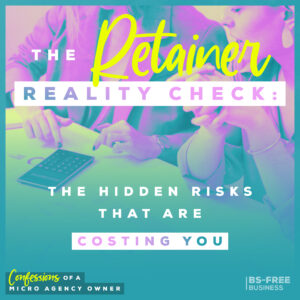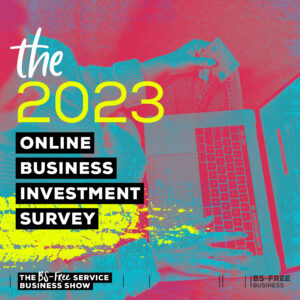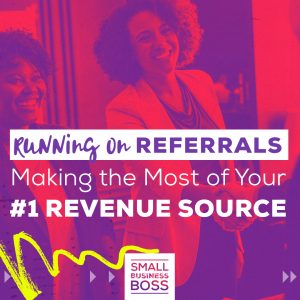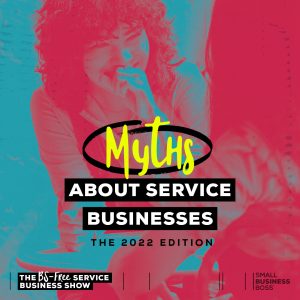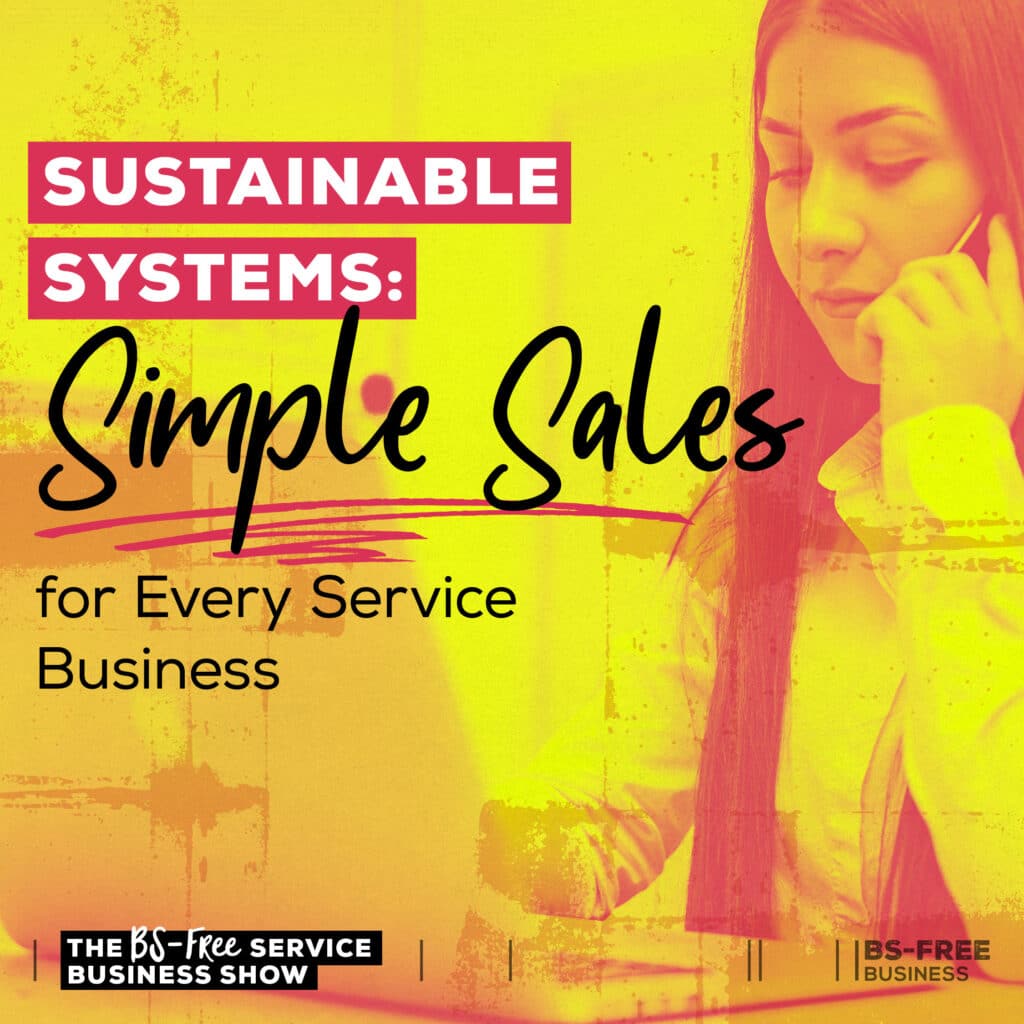
Search the site:
Sustainable Systems: Simple Sales for Every Service Business
Does selling your services stress you out? Do you wish you could skip it entirely and focus on doing what you do best? You’re not alone in that I know many of you hate making sales because it sucks up so much time and energy.
In this episode, we’ll ditch the stress and get your time back by diving into simple sales for every service business.
Today as part of our sustainable systems series, we’re looking at sales systems. Sales is a recurring theme here on the show, but today, we will do something a little differently and look at how we create sales systems that help us create space in our business.
Sales systems may seem like something you may not need, but here’s the thing, if you’re making sales, you’re doing work related to your sales. So what if you didn’t have to spend so much time and energy thinking about your sales? What if you had things flowing so that you didn’t have to sweat every time you went through the process?
Because let’s be real. Clients rarely tell me they love sales. They tell me it’s draining and stressful and sucks up precious time, energy, and headspace. Remember, one of the reasons we want to create sustainable systems is to reduce the cognitive load of making decisions.
That may it seem like a small thing, but here’s why it matters.
Sales Slipups Can Haunt You Later
Decision fatigue is real. We make hundreds of decisions every single day. And as Decision Lab explains, the more decisions we make, the more fatigued we become. As we become overwhelmed or tired, then the quality of our decisions declines.
The quality of your decisions may not be a big deal when it comes to what type of salad dressing to pick or which shirt to wear, but when it comes to sales, you want to make high-quality decisions.
Why? Decisions made in your sales process impact so many aspects of your business. Think of a time you decided to quote a price on a call, which was wrong. Or when you scoped a project incorrectly and did hours and hours of work for free.
Seemingly small decisions during your sales process can become big headaches that haunt you later. Essentially, your sustainable sales systems exist to save you from yourself.
Rather than having a full-blown meltdown over potential mistakes in your sales process, put in some effort beforehand to minimize the risk of poor decision-making.
As a refresher, here’s what we want our sustainable systems to do for us:
Decision fatigue is real. We make hundreds of decisions every single day. And as Decision Lab explains, the more decisions we make, the more fatigued we become. As we become overwhelmed or tired, then the quality of our decisions declines.
The quality of your decisions may not be a big deal when it comes to what type of salad dressing to pick or which shirt to wear, but when it comes to sales, you want to make high-quality decisions.
Why? Decisions made in your sales process impact so many aspects of your business. Think of a time you decided to quote a price on a call, which was wrong. Or when you scoped a project incorrectly and did hours and hours of work for free.
Seemingly small decisions during your sales process can become big headaches that haunt you later. Essentially, your sustainable sales systems exist to save you from yourself.
Rather than having a full-blown meltdown over potential mistakes in your sales process, put in some effort beforehand to minimize the risk of poor decision-making.
As a refresher, here’s what we want our sustainable systems to do for us:
- Enable us to make key decisions in advance.
- Provide consistent support with tools, templates, and tech.
- Be easy to use and reference daily.
Sales Stress: From Rejection to Resilience
There are multiple steps in the sales process; some may feel squishier or more stressful than others. Those are the ones you should likely need systems for!
But before we get into the nuts and bolts of the systems, I want to address a key question about why sales feel so stressful for many of you.
There are many reasons, but I want to acknowledge some of the big ones as they may result in resistance or avoidance of dealing with sales-related systems.
A big one I’ve discussed in-depth on the show is that you think you’re bad at sales. Honestly, you’re probably not bad at sales. Sales are so much simpler than people realize, but we work in a culture where we’re told “sales are hard” and are pushed solutions nearly daily.
Before I was in the online business world, I’d been making sales for over a decade. It hadn’t been a problem until I encountered this person doing a program on selling. Many friends did this program, and I had a major case of FOMO as I was worried I didn’t know what I was doing.
That messaging and marketing can be potent, so I encourage you to shut it out and just focus on sorting out your sales systems. That will do more to help you feel confident about your sales skills than any high-ticket program ever will.
For some of you, the fear of rejection or that you’re not good enough may factor into how you feel about sales. And I want to remind you that if someone doesn’t want to work with you it’s not a judgment on you, and if they’re engaged in the sales process with you, there must be a reason that they got there in the first place. Generally speaking, people do not talk to people about potentially working together if they think the person is unqualified and unskilled.
Finally, you may simply be overwhelmed by the process. You may feel like you don’t have time to deal with potential clients or to do the work you need to do to get them to say yes.
That’s exactly why you need these sales systems in place, stat! The goal is to build sustainable systems that help you build resilience around anything that stresses you out about your sales.
Sales Simplified: Must-Have Systems for Every Service Business Owner
Now, let’s get down to it and talk about simplifying your sales. Some of these elements may vary depending on what type of services you offer and who your clients are, but I want to talk through a typical sales process.
Packages
What you’re selling is the starting point for your sales process. If you offer services, there are countless ways to sell your services, but I highly recommend you have packages.
If you’re creating a custom package for every client, you need to cut that out. You’re making your sales process more complicated than it needs to be!
Creating a package lets you pre-decide on the scope of work, deliverables, and so on and position your services as a solution to a problem. Some of you immediately went on the defense and thought, “But my clients are all so different.”
I’m going to challenge you on that. Are they all really that different? You can create different packages for different types of clients, or better yet, niche down because working for anyone and everyone doing everything is making your business harder than it needs to be.
Having packages helps you spend less time in the sales process as you’re targeting a specific group of potential clients, so you’re not wasting time with people who will never be a fit. Plus, you know exactly how to scope a project out.
Pricing
With your packages developed, you must also have clear and consistent pricing. In terms of systems, you need a pricing strategy in place.
For example, what’s the baseline hourly pricing you use to calculate your prices? What are your hard costs? How much markup or padding do you need to include?
These questions may not seem like a “system” per se, but having these ironed out enables you to take a systematic approach to pricing your projects. It removes the emotion or judgment and helps you ensure you don’t underprice yourself.
This may be as simple as having a pricing plan and calculator in place, so you’ve done this critical thinking in advance. (And if you need help with this, check out Profitable Pricing in the BS-Free Business shop.)
Consults
You know something I don’t like? Awkward conversations with strangers, especially when those strangers are deciding whether or not to work with us.
This is why having a system around consults has been a total lifesaver. Instead of getting on Zoom and feeling like the whole thing is totally awkward and then nervously talking to fill the air, I have a structure to follow.
Invest some time in deciding, in advance, everything related to your consults, including:
- Who gets to have a consult? What do they need to do?
- Where do they book?
- How long is the consult?
- What’s the structure of the call?
- Where does it happen?
- What templates, tools, and tech do you need?
Getting that all out of the way lets you not just show up and shine on the call but removes all the questions before the consult that can stress you out. Plus, you’re not wasting time on calls that are people picking your brain or going nowhere fast.
Proposals
Next up are proposals. Once you’ve had that initial conversation with a client, you’ll likely be sending them a proposal.
I know that many people hate proposals, so I’m dedicated to singing their praises at every opportunity.
The reason proposals suck is that you’re doing so much of the work at the moment vs. relying on your sales systems. If you have your packages and pricing nailed down, that makes putting them into the proposal easy. You should have that templated and ready to pop into a proposal.
If you write proposals for the love of your service business and your sanity, please sit yourself down and create a template for your proposal. (And seriously, if you want a template in Canva or Google Docs that looks professional and will speed up this process, just go get my Proposal Template Pack already. It will pay for itself as soon as you land one new client.)
Aside from a template for your proposals, I recommend creating template emails for sending your proposal and deciding if you want to use any tools. For example, we deliver our proposals for the agency via Proposify. It’s definitely a nice-to-have, but it’s significantly sped up the process of creating and sending proposals.
Other Sales Tools
Depending on what type of work you do may need certain sales tools. For creative work, you may need a portfolio. For other industries, you may need client references or a one-pager with a summary of your services.
If you’re unsure, pay attention to where you get questions from potential clients in the sales process. That may be a sign that there’s a bit of friction, and you need something else to help them decide.
We often send our portfolio to potential clients before a call, or as part of a proposal. As a result, we ensure it’s up to date and ready to go at a moment’s notice.
With B2B tech companies, we’re occasionally asked for references from current or past clients, so I have specific people I know are okay with us giving out their contact info.
And finally, sometimes, in the early stages of sales engagement, people need a summary of services with some baseline pricing, so that’s where the one-pager comes in.
What tools you need may vary, but as you consider your sales process, you may need specific supporting elements.
Closing
You’re nearly there, and you’re waiting for a yes. And waiting. And waiting.
The proposal has been sent, and you’ve answered the follow-up questions and nothing. So what do you do next?
This is why you need a closing system. This can be a simple set of emails where you follow up with them at set intervals. You can simply write the emails in advance and set reminders for you to send them out. That helps make it a task to handle versus something that sucks up energy because you don’t know what to do, so you do nothing.
(And if you want my closing scripts, they’re included in the Consults and Closing workshop in the BS-Free Shop.)
Fumbling the follow-up can mean the difference between a yes and a big fat nothing. So with a little setup, you can close more new clients
Ready to Set Up Your Sales Systems?
After listening to this, you likely have identified a few areas where you need to work on your systems, or you’re ready to revamp how you’re doing things right now. No matter where you land, time invested in your sales systems will make your sales process smoother and more sustainable.
This a quick reminder as you think about where you may need a few tweaks or tucks. Simple systems are sustainable systems. You don’t need to overdo it. You don’t need fancy tools. Those things are a waste of your time and money if they don’t work for you.
As I’ve shared through this series, the systems I use today in my business are simple but sustainable. They may need an update from time to time, but they’re relatively low maintenance. They create space for me to do my thing and not stress out about sales.
Simple is sustainable.
Speaking of which, if you’re listening to this episode in real time, everything in the BS-Free Shop is currently 35% off until Wednesday, May 24th.
For your sustainable sales systems, I recommend you check out the Profitable Sales Bundle which includes Profitable Pricing, the Proposal Template Pack, and Pitch Perfect Proposals. As a bundle, you get 10% off anytime, and when it’s on sale, you take another 35% off!
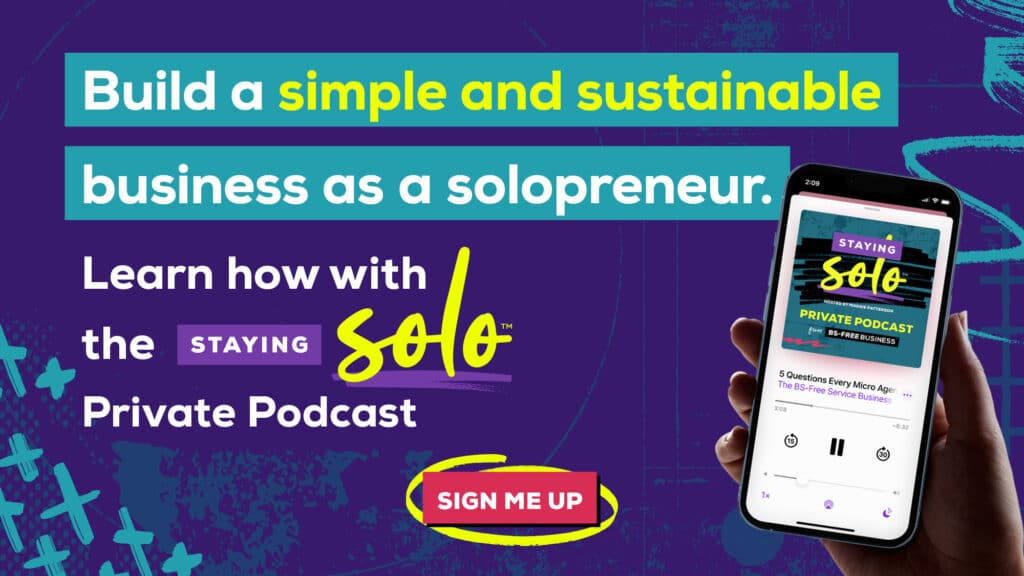

I’m Maggie Patterson (she/her), and services businesses are my business.
I have 20+ years of experience with client services, am a consultant for agency owners, creatives, and consultants, and vocal advocate for humane business practices rooted in empathy, respect, and trust.
Read or Listen to the Latest
For Solo Business Owners

Growing a solo service business is tough.
It’s even harder when you’re bombarded with BS advice that steers you away from your values and why you started your business in the first place.
This is the podcast for solo creatives and consultants who want to remain as a team of one and have zero interest in the hustle and grind of typical business teachings.
Subscribe now and never miss an episode.
For Micro Agency Owners
Most podcasts for agency owners obsess over revenue growth as the ultimate success metric.

But here’s the truth: not everyone wants to make millions. Your goal might be to build a sustainable business that lets you have a life and doesn’t run you into the ground.
Join me as I spill my shameless confessions and share everything I’ve learned about building a micro agency that skips the BS of tired and typical agency teachings.
Follow Now on All Major Podcast Platforms
